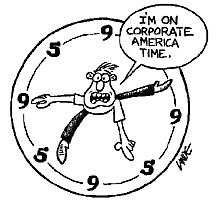
go to WASHINGTON FREE PRESS HOME (subscribe, contacts, archives, latest, etc.)
Jan/Feb 2001 issue (#49)
On December 4, 2000, the Washington State Court of Appeals issued a strongly worded decision upholding the right of workers who have not been given the paid ten-minute rest breaks guaranteed to them under Washington law to sue their employers for money damages.
The decision, which came in the case of Wingert v. Yellow Freight Systems, arose out of a lawsuit filed in 1998 by approximately sixty unionized Yellow Freight Systems employees. The lawsuit, which was funded by General Teamsters Local No. 174 on behalf of its members, alleged that Yellow Freight Systems worked these employees up to two hours of overtime, on top of eight-hour or ten-hour shifts, without providing them with a third paid 10-minute rest period. The employees argued that Washington Administrative Code provision 296-126-092(4), which prohibits any employee from being worked "more than three hours without a rest period," was being violated by this practice.
The lawsuit was initially dismissed, in 1999, by King County Superior Court Judge Richard A. Jones, on the grounds that (1) workers are not entitled to a third paid rest period until they have worked three hours of overtime, and (2) workers' only option, even if their rest period rights are violated, is to file a complaint with the Department of Labor and Industries. This latter principle--that Labor and Industries provides the exclusive remedy for violations of the right to rest and meal breaks--has generally been accepted to be the law in Washington State.
The Court of Appeals, however, in a carefully reasoned decision, reversed Judge Jones' ruling, holding that the right to have a rest break after three hours of continuous work is "clearly and unambiguously" set forth in the regulation.
The Court of Appeals strongly disagreed with Yellow Freight's attempt to argue that these workers, because well paid under the terms of their Teamster Local 174 contract, were not entitled to these rest breaks. "Reduced to its essence," the Court explained, "Yellow Freight asserts that well-paid workers do not need periodic rest breaks. Yellow Freight's argument misses the point of the industrial welfare statutes."
The Court then held that employees have standing to sue for these rest break violations, and are entitled to compensation (at their overtime wage rate) for the value of the work they provided to the employer, i.e., the ten minutes worth of work they provided while they should have been resting. The Court stated:
Yellow Freight wants two hours of work performed at the end of its employees' regular workday. If its employees are provided with the required 10-minute rest period, their workday will be extended by 10 minutes. Thus, they should receive compensation for two hours, 10 minutes. That the employees work through their break, leaving after two hours, does not relieve Yellow Freight of its obligation to pay for the additional 10 minutes of labor it receives when its employees are legally entitled to a rest break.
Employees are also entitled to recover back interest on the amounts they are owed, court costs, and reasonable attorneys' fees incurred in pursuing this back pay, and may also be eligible to receive punitive damages in amount equal to the amount of wages they were deprived of.
Finally, the Court of Appeals explained that the employees' right to sue stemmed from the legislative intent underlying all of Washington's industrial health and safety statutes. The Court's reasoning clearly applies, therefore, to any violation of Washington's rest and meal break requirements (such as that there be meal periods every five hours, or that employees have no less than one paid rest break for every four hours worked), and should also apply to provide an individual cause of action with regard to many other health and safety violations.
Yellow Freight now has the right to seek review by the Washington State Supreme Court of this decision. Until and unless that review occurs, however, this decision is the law of Washington State, enabling individual employees to sue employers directly for money damages for these, and other, violations of the Washington Administrative Code.
The Yellow Freight employees were represented by Dmitri Iglitzin, Esq., and the law firm of Schwerin Campbell Barnard LLP. The Washington State Labor Council assisted in the litigation as an amicus ("friend of the court") on behalf of the Yellow Freight employees.

|
go to WASHINGTON FREE PRESS HOME |